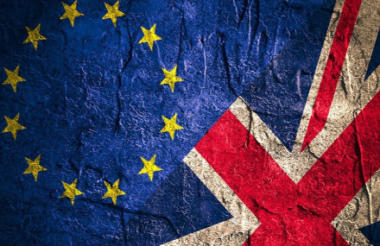Andrew O'Brien says that charities need to speak up over Brexit to make sure their beneficaries voices are heard in the debate.
Those that hoped that 2016 would be the ‘Brexit’ year and we could get on with the rest of our lives in 2017 are likely to be disappointed. 2017 is likely to be Brexit, Brexit, Brexit.
As you’d expect from an issue of this level of importance everyone is trying to influence the process. There was confusion between the regulator and the government before the referendum on whether charities should speak up and make their views known. But now that a decision has been made, our sector needs to speak up. Politicians, media and business all have their own agendas and ideological reasons for pursuing different Brexit options. However, charities have a duty to ensure that their beneficiaries’ needs are considered and aren’t left behind in the debate. We aren’t party political or ideological – this makes our voice even more crucial.
Were charities heard?
Back in October 2016, when trying to gauge whether charities are being heard in the Brexit debate, we commissioned ComRes (alongside the Institute of Fundraising) to poll a nationally representative sample of the public to ask who they thought the government should consult when deciding on our deal with the EU and on future policies. The full tables can be downloaded from the ComRes website.
The results were disappointing, but there were areas of encouragement.
Unsurprisingly when we asked people who government should consult Parliament was top of the list. 58% of the public believe that the government listen to Parliament on what a good deal on the EU would be and future policies. Business was second on the list, with 57% of the public responding that they should be consulted on the deal – although fewer (42%) thought they should be consulted on future policies.
Only 27 per cent of people think charities should be consulted
Third and fourth on the list were devolved governments and think tanks. Trailing behind in fifth place were charities and civil society groups, with just 27 per cent thinking that they should be consulted on the Brexit deal – although more (31 per cent) thought that charities should be consulted on future policies. The only group that the public were less likely to agree should be consulted on Brexit or the future was the media. Not something to brag about!
If you are a glass-half-full kind of person, then I think you will take heart from the fact that nearly one-third of the public think that charities should be consulted on Brexit and future policies. I would agree that this is certainly a strong base on which charities can grow.
41 per cent of younger people think charities should be consulted
There were also positives with younger people (18-24) more likely to say that charities should be consulted on future policies (41 per cent) than over 65s (30 per cent). Arguably, negative stories about charity in the media haven’t helped with this demographic. Backing for charities on future policies was also particularly strong in the North East of England (43 per cent) and London (38 per cent).
But the big gap between the charity sector and businesses on informing the Brexit deal is alarming. Businesses have a right to campaign for future policies, but they have their own interests and ultimately, their influence is primarily in order to protect or improve their profitability. This is their fiduciary duty to their owners and shareholders. As we know, charities are not in it for themselves. They have a statutory responsibility to act in the best interests of their beneficiaries and so when they speak out on issues, it is because they have reason to believe that it is in the interests of their beneficiaries. This is an important public service. So it is worrying that charities are not considered as critical a stakeholder as the business community.
Of course, businesses have a huge impact on our society and concerns about the economy may be driving people’s support for their involvement in the Brexit deal. But many of the big issues facing our country are not just about the economy, but are social. This is where charities and civil society organisations are at the cutting edge and where their experience is most needed.
Strengthen 'brand charity'
The deal that we get through Brexit is going to impact on our ability to tackle these challenges. So we must influence that process. Many charities are already working on their particular areas of expertise, but we also need to strengthen ‘brand charity’.
Charities are not going to be listened to by right, they need to fight for a seat at the table and for a chance their beneficiaries needs to be considered.
Politicians are acutely sensitive to the Brexit vote. Many of them still feel they were caught out and ‘misread’ the public mood. As such they are more sensitive to the public mood than usual. So we need to do more public facing work to encourage citizens to understand that a balance of views needs to be at the top table when it comes to Brexit and future policy. Working behind the scenes is important, but a strong hand requires public backing – otherwise, politicians will gravitate to those stakeholders (like businesses) which they feel are more influential amongst the public.
As I wrote at the start of this piece, Brexit is going to be a long process. Arguably, it hasn’t even started yet. Charities shouldn’t panic about lacking traction. This is also only one poll carried out several months ago. But it is useful warning sign, that charities need do more to make the case for why they should be listened to. Otherwise, we could end up stuck with a Brexit future that damages our ability to help our beneficiaries.
Andrew O'Brien is head of policy and engagement at Charity Finance Group.
Related articles











